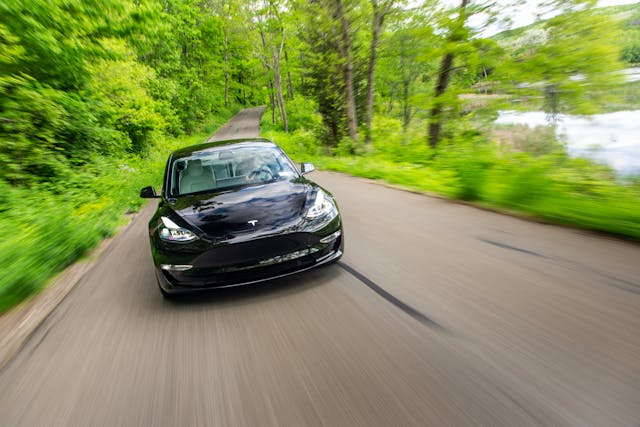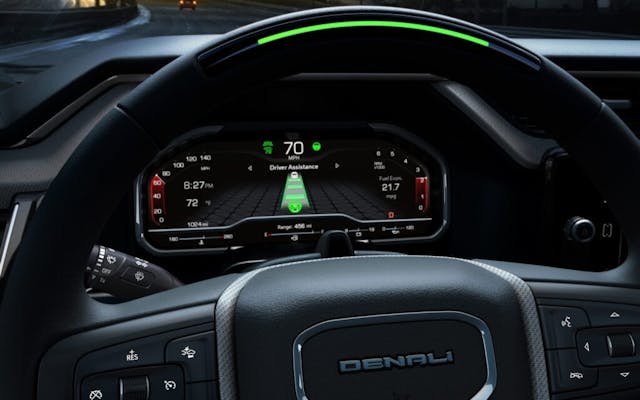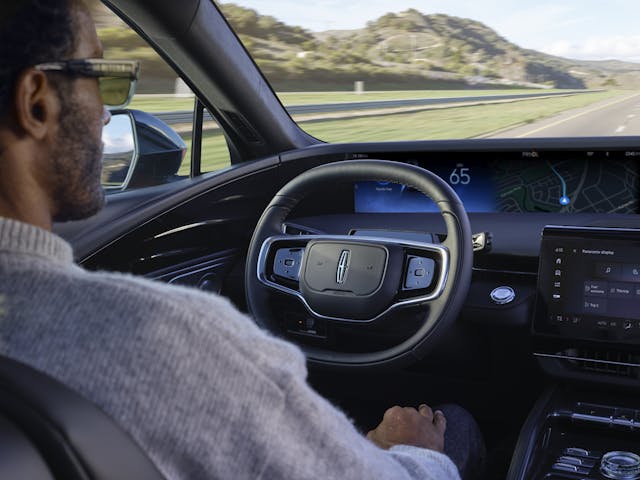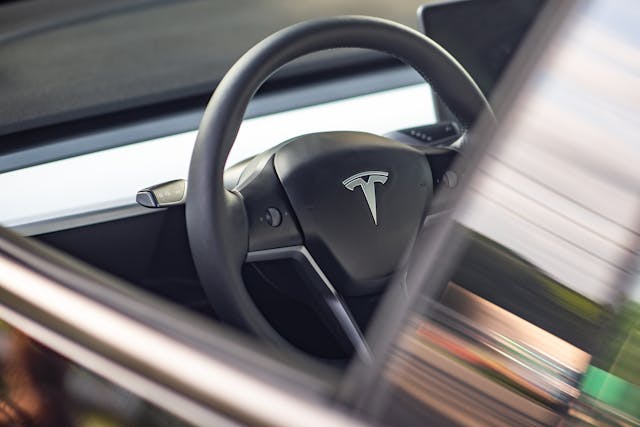Modern cars are always watching us. Should we be worried?
Nearly 20 percent of drivers admit to picking their nose in their cars. That admittedly gross statistic (based on a U.K. survey) alludes to a larger truth: We tend to think of our cars as private sanctuaries. Yet technology for self-driving cars, much of it already on the market, threatens to turn that sanctuary into a place of intense and constant observation.
“Imagine a world where every car on the road has multiple cameras filming all at the same time,” said Tifani Sadek, a former GM lawyer who’s now director of the University of Michigan’s Law and Mobility program. “We’ve created a massive surveillance state that just didn’t exist before.”
There are a number of ways in which modern cars can watch us. Exterior cameras (the Tesla Model 3 has eight) survey the road, while interior cameras monitor driver alertness. What those cameras see in many cases gets transmitted and used for further development of autonomous vehicles. For instance, Mobileye, one of the leading suppliers of cameras for vehicles, uses the stream from millions of vehicles for what it calls Road Experience Management—a continually updated map of roads around the world.

The greatest shield for our personal information is the U.S. Constitution. In particular, the Fourth Amendment prevents search and seizure without “probable cause.” However, this right is not absolute. For one thing, a private individual or corporation can simply ask for consent to collect and use information—it’s usually buried in those multipage disclosures we all mindlessly accept. Even without that, a court will ask whether your expectation of privacy was “reasonable.” What exactly qualifies as reasonable depends on several factors, including where you are (in your home, you might reasonably expect a lot of privacy; walking down Times Square, very little) and from whom you want privacy (there’s generally greater protection against government intrusion than from individuals or companies). The standard has also evolved over time. Forty years ago, you’d never expect a company to know or care what photos you looked at or what news stories you read. Nowadays, companies like Google and Facebook monetize such information to the tune of hundreds of billions of dollars.
Therein lies a Catch-22: Intrusions into our privacy have a way of lowering the threshold for the next intrusion. “Government and private-industry surveillance techniques created for one purpose are rarely restricted to that purpose, and every expansion of a data bank and every new use for the data opens the door to more and more privacy abuses,” warned the ACLU back in 2001, when it was advocating against traffic-light cameras.

The constant encroachment not only erodes our legal rights but needles us psychologically. We’re already being tracked by our phones and getting eavesdropped on by Alexa. Does it really make that much of a difference if we’re also being watched in our cars?
It very much does, says Sadek, because of how we use our vehicles and, more specifically, whom we put in them. “We have passengers, and we have minors in the car,” she notes. “If I get into an autonomous vehicle that has a camera, it’s watching my kids, too.”
Granted, most companies aren’t out to steal your individual information. Mobileye, for instance, says it scrubs identifying details from its camera footage, not just because doing so is ethical but also because it makes the data easier to transmit and process. The fact that you told your boss you were at home when you were actually driving to a Taylor Swift concert is a boring waste of bandwidth (but beware that if you’re in a company car, your boss might be able to track your location).

Most automakers who operate in the United States have committed to “Consumer Privacy Protection Principles,” a document created by the Alliance for Automotive Innovation. Some of those principles are distressingly vague (“Participating Members commit to collecting Covered Information only as needed for legitimate business purposes”) but at the very least reflect a desire to protect privacy beyond the letter of the law. It’s worth acknowledging that real-world driving data has the potential to dramatically improve safety on public roads, as well. Most of us trade privacy for far less. “I know Google is crawling through my emails, and I don’t mind it, because it tipped me off that I’m going to be late due to extra traffic on the road,” says Sadek.
In any event, shutting down the car cameras is likely impossible. It may be more reasonable to expect laws that clarify what kind of information a car (or any technology) can collect from an individual. In many places, such laws already exist. In 2016, the EU passed the General Data Protection Regulation, which stipulates an individual’s “fundamental right” to certain levels of data protection from both public entities and private companies. Some U.S. states, like California, have passed similar bills. Given how easy it is for data to cross state lines, the need for federal regulations seems obvious. “We’re trying to read this 200-year-old document to figure out what it means about autonomous vehicles,” says Sadek. “It would be much easier simply to pass some legislation that clearly states what rights you have, and what rights you don’t have.”
***
Check out the Hagerty Media homepage so you don’t miss a single story, or better yet, bookmark it. To get our best stories delivered right to your inbox, subscribe to our newsletters.



Well with the tech today it is going to be a part of all we do. We can be watched, listened too and followed no matter what. Most of it is innocent but the ability to make it into a tool against is always a spector out there.
As I have become more prosperous in life, I always figured that I would graduate to a new daily driver while still having some old toys floating around. As time has moved on, the new car has moved further and further from being something I want. Not sure what I am going to do 20 year from now, but so far the old stuff is still keeping me going
And the coming “Kill Switch” or “Speed Limiters” being mandated or proposed for “the greater good”. I find the future of new cars less exciting.
Back in March I bought a Corolla GR.
This is a link to the operators manual: https://assets.sia.toyota.com/publications/en/om-s/OM12S02U/pdf/OM12S02U.pdf?_gl=1*1kvd2gi*_tmna_ga*MTMxMjMwNzI4Mi4xNjkxMjY4MTQ5*_tmna_ga_EP43E5EFVZ*MTY5MTI2ODE0OS4xLjEuMTY5MTI2ODE4Mi4yNy4wLjA.
Starting on Page 6 is Vehicle Data Recording. It runs on through Page 9. Those who are interested, and everyone who buys a new car, Toyota or otherwise, since they all include the same ‘safety features’ should be, can read it directly.
Basic vehicle behavior related data (engine speed, accelera- tor/brake pedal operation, vehicle speed, etc.)
Operating state of the driving support systems (recorded during system operation, includes basic vehicle behav- ior related data)
Driving support system sensor data
Image data (images from the front, rear and side cam-
eras)*2
*2:The vehicle has multiple cameras. For details on from which cameras images are recorded, contact your Toyota dealer.
Location information
And that is just the P6 introduction to Vehicle Data Recording
P7 gives us this:
In situations such as the following, Toyota may disclose the recorded data to a third party:
When the consent of the vehicle owner (or the lessee if the vehicle is leased) has been given
When officially requested by the police, a court of law or a government agency
When it is to be used by Toyota in a lawsuit
The section on the Event Data Recorder is ‘interesting’. Or should be.
The short answer to David’s question is YES. With as many exclamation points as seems appropriate.
I personally an uneased by all of this intrusion into our lives.
I know there is little one can do about it, but I will make small decisions that will limit these intrusions, just for my own sanity.
I hope I will be able to continue to get low mile vehicles older than 2012 for the next couple of decades (If I’m still around).
The Fourth Amendment-indeed, the entire U.S. Constitution-protects against government intrusion on our rights. Intrusion by private industry can be governed only by regulation based on Constitutional rights. In other words, private industry can data mine to its heart’s content unless or until it violates a some government regulation.
Although it pains me to say, it looks like further government regulation will be needed to protect us from the privacy pirates (kind of a Catch-22/fox in charge of the henhouse proposition, no?)
What irritates me the most is the nagging: Close the sunroof, don’t open the door, the engine is still running, check the back seat, you are exceeding the posted speed limit (even when the gadget has ‘read’ a sign that isn’t there), stay in your lane, change gear…. The list is endless, and the car doesn’t know what you are doing at the time anyway.
And being spied on, in any way, invades my personal space and right to privacy. Big Brother is not my friend. I don’t want him anywhere near me.
The Fourth Amendment only applies to government action. I agree with the sentiment of this article, but the legal part got a bit muddled.
Driving manners have gotten so bad and the roads so crowded we need to be monitored. Even the professional drivers are bad and their job depends on their driving.
I don’t know about that. As a pedestrian, I find in the last few years a lot of cars have stopped for me in situations where I would have said they had the right-of-way. Not so sure I’m a fan of it, actually. I mean, if I continue and my current speed and the car continues at its current speed, my path will intersect behind the car. And what happens? The car slows down; now I don’t know what it’s doing. Did it slow down for me, or something I don’t know about (and so may return to its previous speed without warning?)
What year vehicles start the “monitoring”? That will help with future purchases and may become a new collector market.
Depends on your definition of “monitoring.” They’ve been making regular “seat belt check” sweeps (I happen to subscribe to the notion that the original check-on-ignition “reminders” back in the 1960’s were a 4th Amendment violation) since the 2005 standards.
This is an interesting read:
https://foundation.mozilla.org/en/blog/privacy-nightmare-on-wheels-every-car-brand-reviewed-by-mozilla-including-ford-volkswagen-and-toyota-flunks-privacy-test/
The Mozilla assess privacy of various products, including cars, and says “All new cars today are privacy nightmares on wheels that collect huge amounts of personal information.”